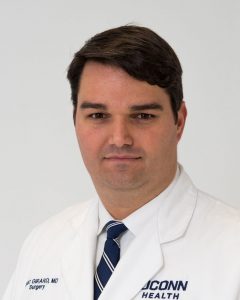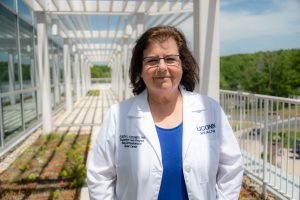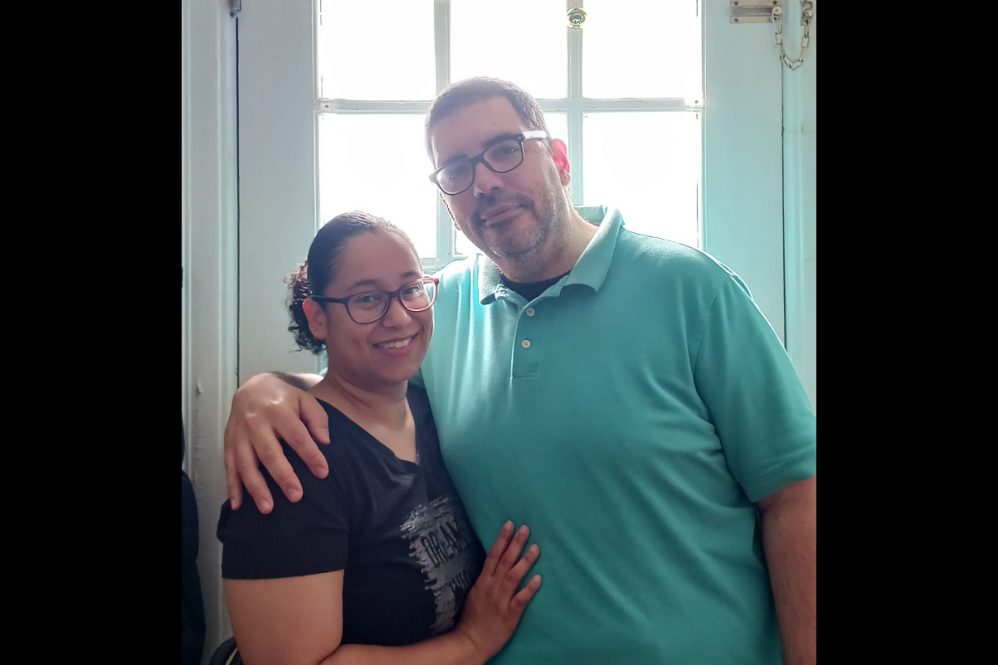The diagnosis of any type of cancer is devastating and for Carlos Cabrera, the day he was diagnosed with rectal cancer totally changed his life and shattered his wife. With treatment, surgery, and mental health care, he has come out on the other side, cancer-free and with a change of outlook on life.
Cabrera was suffering from pain in his rectum and struggling with bowel movements that included blood. While his primary tests were all coming out normal, he went to the emergency department at UConn John Dempsey Hospital for extreme pain.
An X-ray confirmed that there was something going on and Cabrera was scheduled for a colonoscopy, where doctors found rectal cancer. An MRI was scheduled in a week to determine the stage of cancer and determine a plan.
“This was a tough and traumatic week, I was depressed and thought of the end,” says Cabrera. “All I could think of was what would happen to my wife and children.”
The MRI showed he was in stage 3, where the tumor has invaded the lymph nodes next to the rectum and some tissues outside of the rectal wall.
Rectal cancer affects about 5% of the population and about 11% of those are under 50 years old. Cabrera was 44 when he was diagnosed, with no family history.
Rectal cancer develops when cancer cells form in the rectum, the last six inches of the large intestine. The rectum is a chamber that’s located between the colon and the anus.

Symptoms of rectal cancer include:
- Rectal bleeding
- Blood in your stool
- Diarrhea
- Constipation
- A sudden change in your bowel habits
- Narrow stool
- Tiredness
- Weakness
- Abdominal pain
- Unexplained weight loss
Cabrera met with Dr. Eric Girard, assistant professor of surgery at UConn Health, who had a plan to treat the cancer aggressively
“Dr. Girard was honest and direct and said, ‘this is the plan, we are going to work through this and you will be OK,’” says Cabrera “This was the first time I thought, ‘I’m going to survive this.’”
The plan included chemotherapy, radiation, and surgery, and would take about eight months to a year to treat.
The next several months were horrible for Cabrera; the pain, weight loss, lack of sleep along with increased anxiety caused him extreme misery and depression.
“I couldn’t walk having to use a wheelchair and had lost so much weight, I was skin and bones,” says Cabrera. “The side effects from the chemo and radiation combination were absolutely horrible.”
The supportive/palliative care nurse practitioners at the Carole and Ray Neag Comprehensive Cancer Center have been heavily involved in his symptom management to improve his pain and symptom burden as well as his quality of life during active treatment and into survivorship.
He began to see Judith Cooney, health psychologist and associate professor of psychiatry, to help cope with the distress of his cancer diagnosis, his difficult acute treatment and complication phases, and the post-treatment phase of his cancer.

“It has been wonderful to work with Carlos and to help him through this very difficult process. He was able to use many of the tools to help him relax, manage worry and negative emotions associated with cancer and treatment,” says Cooney.
Cooney not only works with patients, but their families as well incorporating his wife into treatment as an essential caregiver and part of the solution for his coping and improvement.
“Carlos’ cancer has been very stressful for his wife, and our treatments have also helped her to cope with this difficult ordeal,” says Cooney.
He looked forward to the day of his operation but was scared. The eight-hour operation ended up taking 11 hours due to complications with the colon. His spleen was also enlarged and removed during surgery.
Ten days after the surgery he had a blockage in his bowel and ended up in the hospital with a tube that went down his nose to his stomach for eight days.
“I was in a bad state, it was during the COVID-19 pandemic and we couldn’t have visitors, which made it more difficult,” says Cabrera. “The nurses were amazing during this time, knowing how hard it was.”
After the tube was removed, he was sent home and started to feel better, looking at life more positively.
However, another complication of fluid backed up in his rectum left from the surgery requiring a drain from his rectum to his buttocks which remains open as an abscess to keep the fluid draining. While not painful it’s a bit uncomfortable and he has to change bandages to keep it clean.
The entire year of his treatment, he was out of work, but now he is cancer-free and back to normal. He doesn’t think about cancer 24/7 and is living life to the fullest and spending time enjoying his family.
Since he completed acute treatment he and Cooney have been working on his returning to his life and responsibilities at work and home, living a healthy lifestyle by optimizing his eating and exercise behaviors, and spending more time with his family, which he realized is his most important goal. He is now optimistic, happy, healthy, living the life he most values and thriving as a cancer survivor.
“I didn’t know what to do with myself and Dr. Cooney was remarkable in helping me work through my emotions, providing support and tools,” says Cabrera. “I am so grateful for her help.”
“I want people to know that there is hope, that I had a horrible experience and was miserable and crying all the time, but in the end, the cancer is gone and life gets better,” says Cabrera.



